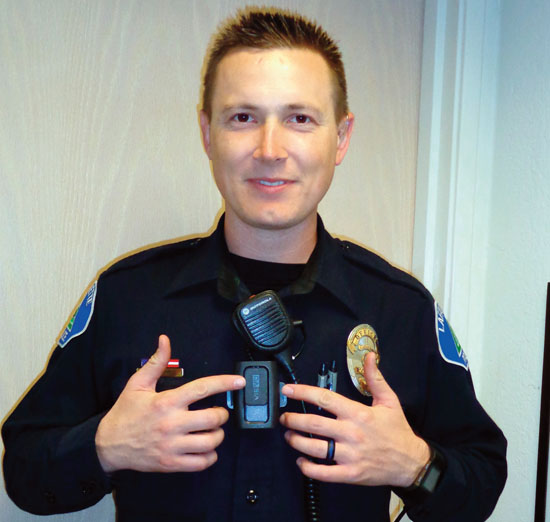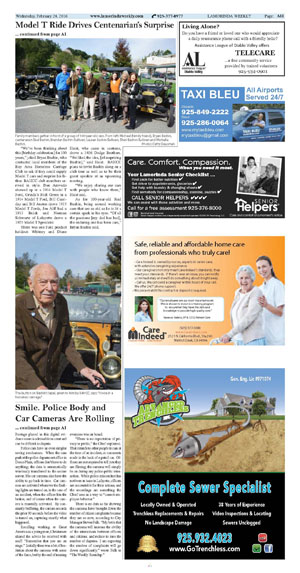|
|
Published February 24th, 2016
|
Smile. Police Body and Car Cameras Are Rolling
|
|
| By Cathy Tyson |
 |
| Officer Michael Marshall points to his body camera. Photo C. Tyson |
Pulled over by one of Lafayette's finest? Smile, because the police will now be recording the audio and high definition video of the incident.
 All 22 of the Lafayette police officers are now outfitted with small body-worn video cameras to record interactions with the public. In addition, video cameras are installed in all police cars and will soon be coming to police motorcycles.
All 22 of the Lafayette police officers are now outfitted with small body-worn video cameras to record interactions with the public. In addition, video cameras are installed in all police cars and will soon be coming to police motorcycles.
 Although there are very few complaints, and those that are received are mostly from "outsiders," according to Chief Eric Christensen, the cameras protect the public, officers, and the city by recording what actually happened. "It changes the dynamic," says the Chief. "It's our insurance policy."
Although there are very few complaints, and those that are received are mostly from "outsiders," according to Chief Eric Christensen, the cameras protect the public, officers, and the city by recording what actually happened. "It changes the dynamic," says the Chief. "It's our insurance policy."
 Cameras were approved last summer by the city council at a cost of $75,000 and have been run through a series of tests since the fall. After thorough training, the police have been rolling the cameras since January. Each body-worn camera costs $775 per unit, and roughly $6,000 per police cruiser, in addition to a small amount for on-going data storage.
Cameras were approved last summer by the city council at a cost of $75,000 and have been run through a series of tests since the fall. After thorough training, the police have been rolling the cameras since January. Each body-worn camera costs $775 per unit, and roughly $6,000 per police cruiser, in addition to a small amount for on-going data storage.
 Technology makes the system very user-friendly. At the end of their shifts, officers download the day's interactions from their deck of cards-sized body camera onto a secure server in the office, where the information is kept for two years, tagged and sorted by date. Officers can look at the encounter, but cannot delete or change anything. Footage placed in this digital evidence room is admissible in court and can be difficult to dispute.
Technology makes the system very user-friendly. At the end of their shifts, officers download the day's interactions from their deck of cards-sized body camera onto a secure server in the office, where the information is kept for two years, tagged and sorted by date. Officers can look at the encounter, but cannot delete or change anything. Footage placed in this digital evidence room is admissible in court and can be difficult to dispute.
 Police cars have an even simpler saving mechanism. When the cars park at the police department office in Desco Plaza, officers don't have to do anything; the data is automatically wirelessly transferred to the secure server. The car cameras also have the ability to go back in time. Car cameras are activated whenever the flashing lights are turned on, in the case of an accident, when the officer hits the brakes, and of course when the camera is manually activated. By constantly buffering, the camera records the prior 90 seconds before the video is turned on, capturing exactly what happened.
Police cars have an even simpler saving mechanism. When the cars park at the police department office in Desco Plaza, officers don't have to do anything; the data is automatically wirelessly transferred to the secure server. The car cameras also have the ability to go back in time. Car cameras are activated whenever the flashing lights are turned on, in the case of an accident, when the officer hits the brakes, and of course when the camera is manually activated. By constantly buffering, the camera records the prior 90 seconds before the video is turned on, capturing exactly what happened.
 Recalling working at Great America as a young man, Christensen shared the advice he received with staff: "Remember that you are on stage." Initially there was a bit of hesitation about the cameras with some of the force, but by the end of training everyone was on board.
Recalling working at Great America as a young man, Christensen shared the advice he received with staff: "Remember that you are on stage." Initially there was a bit of hesitation about the cameras with some of the force, but by the end of training everyone was on board.
 "There is no expectation of privacy in public," the Chief explained. That extends to other people in cars at the time of an incident, or comments made in the back of a patrol car. Officers are not required to tell you they are filming; the cameras will simply be on during any police-public interaction. While police misconduct has not been an issue in Lafayette, officers are accountable for their actions, and the recordings are something the Chief sees as a way to "correct employee behavior."
"There is no expectation of privacy in public," the Chief explained. That extends to other people in cars at the time of an incident, or comments made in the back of a patrol car. Officers are not required to tell you they are filming; the cameras will simply be on during any police-public interaction. While police misconduct has not been an issue in Lafayette, officers are accountable for their actions, and the recordings are something the Chief sees as a way to "correct employee behavior."
 There is no data so far showing the cameras have brought down the number of citizen complaints because they are so new, according to City Manager Steven Falk. "My bet is that the cameras will increase the civility of the interactions between officers and citizens, and reduce to zero the number of disputes. I am expecting the number of complaints will go down significantly," wrote Falk in "The Weekly Roundup."
There is no data so far showing the cameras have brought down the number of citizen complaints because they are so new, according to City Manager Steven Falk. "My bet is that the cameras will increase the civility of the interactions between officers and citizens, and reduce to zero the number of disputes. I am expecting the number of complaints will go down significantly," wrote Falk in "The Weekly Roundup."

|
|
|
|
|
|
|
|
|
| |
|
|
|
|




